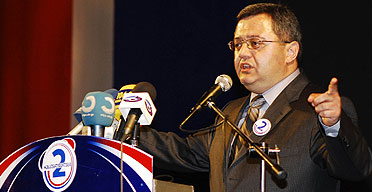Republicans Warn of ‘Irresponsible Forces’ in Opposition

| Davit Usupashvili addresses his party congress in Tbilisi on May 12. Photo: InterPressNews. |
The Republican Party said some forces within the opposition groups were even “more irresponsible” than the current authorities.
“These authorities should go, but the question is who should replace them?” Davit Usupashvili, the party leader said on May 12. “Only removal of these authorities will not solve the problems, we should also think about who will come instead of them. This is the major political issue now and we should not make a mistake here.”
“Because there are even worse potential authorities than are the current ones. This is what we the Republicans are telling the Georgian people. We should not think that worse, than the current authorities are, is impossible. It is possible. There are some in the opposition who are even more irresponsible than the current authorities. The opposition is not one team. There are twelve parties running in the elections and each has its background.”
Davit Usupashvili, who was speaking at the Republican Party assembly marking the party’s 30th anniversary, did not specify those forces within the opposition, he thought were “irresponsible.” Usupashvili’s address was aired live by the Georgian Public Broadcaster (GPB).
Another crucial issue currently on the political agenda, he said, was “how the new government will come into power.”
“Precedents of change of governments through revolutions should end in Georgia; that is the Republicans’ major message,” Usupashvili said. “If we change the government through revolution after May 21, we will be doomed to be engulfed in the swamp of revolutions.”
He said that the Republican Party wanted a coalition government. “The Republican Party is not yet ready to govern on its own and we can declare it frankly,” Usupashvili said. “Our partners from other opposition parties should be frank in this regard as well.”
In his speech Usupashvili also complained about what he called the nine-party opposition bloc’s unwillingness to show deep level of cooperation. In particular, Usupashvili noted that the Republicans were offering the nine-party bloc to have its majoritarian MP candidates in six out of ten Tbilisi’s single-mandate constituencies and the Republicans were ready to nominate majoritarian MP candidates in remaining four constituencies. “But the response was that they wanted to have candidates in all ten constituencies,” Usupashvili said.
He also said that the Republican Party failed to receive enough support from other opposition groups when its proposed to increase threshold of majoritarian MP election from current 30% to 50%. “Only [MP] Zviad Dzidziguri [of the Conservative Party] voiced support,” Usupashvili said. “The opposition could have secured 45-50 majoritarian seats in case of endorsement of our proposal.”
A majoritarian MP candidate winning more than others and more than only 30% of the vote would be declared the outright winner in the first round without the need for a runoff. Under this rule ruling party majoritarian MP candidates are better positioned as they have to compete with several candidates from various opposition parties or blocs, because the overall opposition vote would be split.
The Republican Party itself is often criticized by some opposition groups for quitting the opposition coalition. Usupashvili, however, said that the Republican Party’s proposal was to set up several separate issue-based election blocs between those opposition parties, which had close ideologies. He said the proposal, however, was not accepted by other opposition parties within the coalition.